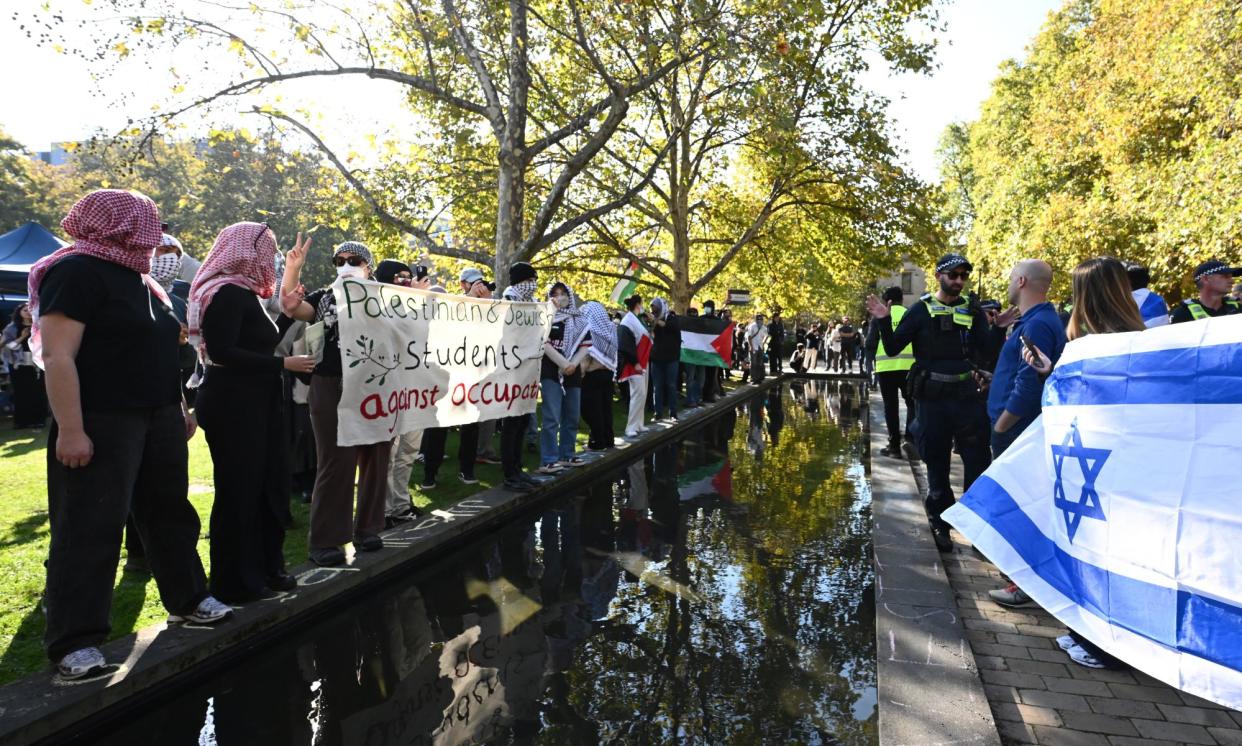‘It’s unacceptable’: as pro-Palestine encampments grow at Australian campuses so do claims of antisemitism

Nazi salutes were allegedly performed during an Australian National University student association meeting this week – the latest in a string of accusations of antisemitism as pro-Palestine encampments enter their third week in Australia.
The Australasian Union of Jewish Students (AUJS) says the alleged gestures occurred at the ANU Students’ Association’s (ANUSA) annual general meeting on Wednesday evening, when a motion was raised by Jewish students to address antisemitism.
The university has launched an internal investigation. A spokesperson says: “Any racism or hate speech, including antisemitism, is unacceptable at ANU.”
The president of ANUSA, Phoenix O’Neill, says individuals were removed from the meeting once it was brought to the executive’s attention, but the students concerned disputed the allegation. ANUSA “condemns and does not tolerate or condone any antisemitic conduct”, O’Neill says.
Related: Monash University: police investigate alleged attack on pro-Palestine camp
Pro-Palestine encampments – and the way universities respond to them – have come under increased scrutiny. Protest organisers say their movement has been peaceful but on Thursday the federal opposition’s education spokesperson, Sarah Henderson, claimed campuses had become “hotbeds of antisemitic activism” in “flagrant breach” of university policies, and said she planned to lodge a motion next week to establish a Senate inquiry into antisemitism on university campuses.
A joint statement by 10 university encampments, published on Thursday, said the protests had been peaceful and opposition to the state of Israel and Zionism as an ideology was not antisemitism.
“Many of the student leaders of our protests are Jewish, and we see ourselves as standing on the shoulders of a long line of Jewish pro-Palestine and anti-war activists,” it said.
What’s happening on campuses
On Thursday, the University of Sydney’s branch of the National Tertiary Education Union (NTEU) voted overwhelmingly in favour of the institutional academic boycott of Israel and for the university to cut ties with weapons manufacturers.
But as pro-Palestine encampments grow, so have the allegations of antisemitism.
At the University of Queensland on Thursday, a window was shattered during a campus protest. The university called it “completely unacceptable” behaviour of one individual.
“We are in daily contact with police and are making a formal report, which will include CCTV footage,” it said.
“The university has written to protest organisers to seek an urgent meeting to discuss the path forward.”
It came as a 23-year-old woman has been charged by police over public nuisance after allegedly breaking into a Jewish academic’s office and urinating on the floor.
The University of Queensland’s pro-Israel camp, which has about two dozen tents, has experienced vandalism and verbal harassment, according to PhD student Alyssa Peterson, who has been camping at the Shalom camp for about 11 days.
“We’ve had many people come through, steal flags, steal food, tear down signs, racial slurs … we get the finger a lot,” she says. She and others plan to meet with the university on Friday to call for an end to the encampments.
A spokesperson for the University of Queensland says the “vast majority” of people have been exercising their right to protest “peacefully and respectfully”. Staff and students have been reminded racism, discrimination and hate speech will not be tolerated, they say.
Students at the university’s pro-Palestine camp – which has about 80 tents – say the woman who was charged had nothing to do with them.
UQ Students for Palestine organiser Laura Nolan says they want to “focus on our demands against the university and to continue to fight for Palestine”.
“We don’t want any provocation.”
At Monash university in Melbourne, pro-Palestine protesters say Victoria police set up surveillance cameras near the encampment after alleged harassment from non-students.
Monash’s student union queer officer and encampment protester Madeline Curkovic says they have been harassed since they set up the encampment, with a group of “mostly middle-aged men” targeting them on the first night, breaking a gazebo and yelling threats.
Curkovic alleged she had been physically assaulted on Monday, which she had reported to police. Victoria police confirmed they were investigating.
‘Weaponisation of antisemitism’
The AUJS supports Henderson’s push for a Senate inquiry, although it is not calling for camps to be dismantled.
“We have identified consistent structural and cultural issues which have happened at numerous universities across the country,” it says. “A collective national response to this growing issue is necessary.”
The Jewish Council of Australia’s executive officer, Dr Max Kaiser, opposes the inquiry, saying he is “deeply concerned” by what he calls the “weaponisation of antisemitism by the Liberal party to target students who are standing up against the genocide of the Palestinian people”.
“We do not support the proposed inquiry into antisemitism, as it is clear that it is highly politically partisan,” he says. “Jewish people are not political footballs.”
The Australian Jewish Association has lashed out at the camps, posting on X that it does not condone anything illegal but “nobody should be surprised if members of the public take matters into their own hands” and comparing the protests to “Nazi encampments”.
Deaglan Godwin, the vice-president of the University of Sydney Students’ Council and an organiser with Students for Palestine, has called the AJA’s comments a “dogwhistle to the far-right to attack the Gaza solidarity camps”.
Curkovic says the focus on clashes takes the spotlight off why students had taken to camping at the university.
“We’ve camped out because we think it’s important to shine a light on Rafah right now,” she says.
“It’s the only place they were told to go to be safe, and now they’re being attacked.
“So we’re out here because we’re outraged by that. And we think our universities are partly complicit in genocide by having a number of ties to military companies that send weapons to Israel.”


